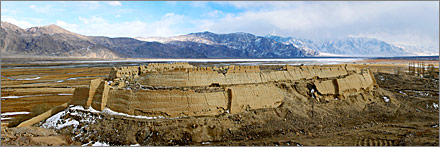« February 2008 | HOME PAGE | April 2008 »
March 30, 2008
I'm Here.
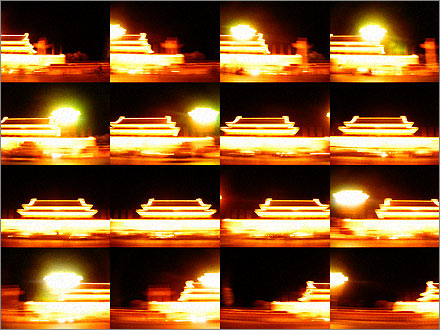
I'm fresh off the train from Urumqi and my question for you, Beijing, is... where 'da party at?!?
Seriously. Please invite me for dinner, a book reading, a bacchanal, a trip to the supermarket, or just a cup of coffee. I'm trying to start a new life here, and what's a new life without new friends?
Email me here or leave details in the comments section.
posted March 30, 2008 at 09:20 PM unofficial Xinjiang time | Comments (61)
March 26, 2008
A Xinhua Masterpiece
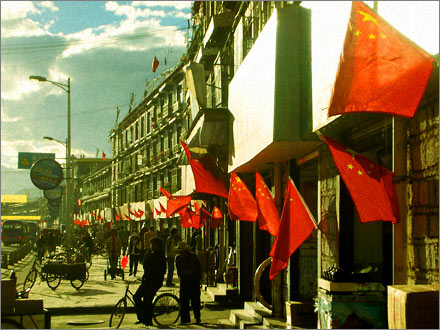
Of all the tremendously informative articles on Tibet that Xinhua has put together over the past two weeks, this has to be my favorite:
Tibetologist: China's patriotic education of
clergy "successful"
BEIJING, March 26 (Xinhua) -- A Tibetan expert told reporters here on Wednesday that China's policy of giving patriotic education to monks and nuns living on the Plateau has been "successful".
Prof. Dramdul, director of the Institute of Religion Studies with the China Tibetology Research Center (CTRC), spoke at a press conference that was organized by China's State Council Information Office.
"The patriotic education in monasteries has been very successful in increasing patriotism and citizen awareness among the clergy," Dramdul said in response to a foreign journalist's question.
"The patriotic education has not taken an excessive amount of the time of monks and nuns; it was combined with religious and literacy studies," the professor said.
Being engaged in religious studies, Dramdul told journalists that the patriotic education process is not political indoctrination.
"It is comprised of training such as teaching the clergy how to work out their financial regulations and manage their financial accounts."
Dramdul also admitted that the patriotic education had been intended to offset "foreign secessionists' infiltration" of the Tibetan clergy.
The 10th Panchen Lama said just before passing away that clergy in all monasteries should be patriots and Tibetan monasteries needed to rectify commandments in line with Buddhist creeds, Lhagpa Phuntshogs, general director of the CTRC, added to Dramdul's reply.
••••
Successful, eh? I'd say the proof is in the pudding.
posted March 26, 2008 at 11:49 PM unofficial Xinjiang time | Comments (77)
March 24, 2008
Loose Ends in Western China
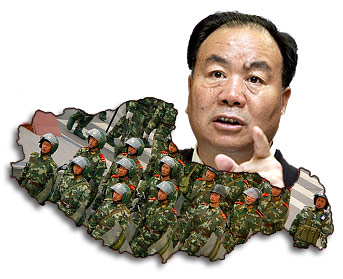 I've noticed in the past few days that people are getting tired of Tibet as an endless news story (kind of like the Iraq War). Even so, I feel compelled to continue posting interesting tidbits gleaned from here and there, if at a more sensible pace.
I've noticed in the past few days that people are getting tired of Tibet as an endless news story (kind of like the Iraq War). Even so, I feel compelled to continue posting interesting tidbits gleaned from here and there, if at a more sensible pace.
There've been two stories published in the past 24 hours that analyze the party machinations behind the crackdowns in Lhasa and other Tibetan areas. A propaganda-style piece in The Sunday Times is of particular interest to this blog as Xinjiang boss Wang Lequan is fingered as the shot-caller for this whole mess:
The real mastermind of Chinese policy towards the restive ethnic minorities is a 67-year-old lifetime communist functionary named Wang Lequan.
Wang has proclaimed himself to be the top terrorist target in China. Nominally, he heads the party in Xinjiang, which, like Tibet, is a vast, remote and resource-rich region troubled by separatism.
However, Wang sits on the powerful politburo in Beijing and has assumed overall direction of policy in both places. He devised the model that has stifled Muslim culture in Xinjiang, staged political trials and executions, poured in millions of Chinese settlers and extracted mineral and energy resources to feed the economy....
His henchman, now applying the master's methods in Tibet, is Zhang Qingli, the region's sharp-tongued party secretary. Zhang is the man who called the Dalai Lama "a wolf in monk's clothes, a devil with a human face". He rose up the hierarchy in Xinjiang and was transferred to Tibet in 2005 as a reward for his loyalty.
What's up with phrases like faceless trio, mastermind, and henchman in a supposedly unbiased report from a respected British paper? Sounds more like the kind of language you'd expect from Xinhua.
Zhang is also mentioned prominently in a New York Times article examining the initially weak response of security forces confronted with rampaging protesters in Lhasa. The story subtly accuses him of 'pulling a Hu Jintao' as events unfolded:
Ultimately, the man responsible for public order in Lhasa is Mr. Zhang, Tibet’s party chief. Mr. Zhang is a protégé of President Hu Jintao, whose own political career took flight after he crushed the last major rebellion in Tibet in 1989.
According to one biographer, Mr. Hu actually made himself unavailable during the 1989 riots when the paramilitary police needed guidance on whether to crack down. The police did so and Mr. Hu got credit for keeping order, but he also assured himself deniability if the crackdown had failed, the biographer wrote.
Mr. Zhang also has an excuse; he was at the National People’s Congress in Beijing.
And Reuters has been running a story saying that Chinese officials are accusing the Dalai Lama "of colluding with Muslim Uighur separatists in China's western Xinjiang region." I haven't been able to find the original source of this accusation... anyone else?
Although things are calm at the moment, tensions in Xinjiang are high with the surrounding provinces in flames. Just today I've heard rumors that (a) there was a bus bombing in Urumqi last night, (b) Han Chinese students were killed by Uyghurs in Kuqa, and (c) a Han Chinese policeman was killed in Kuqa by Uyghurs. Probably nothing to these whispers, but anxiety creates this kind of wild-fire rumor mongering.
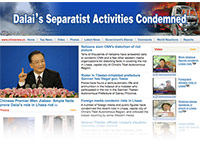 Finally, I've got two websites to recommend for anyone looking for a completely biased propaganda-infused view of the situation in Tibet. The People's Daily Riots in Lhasa archive tries hard to provide an alternative voice to Western media outlets, while the Xinhua-crafted Dalai Clique site takes the art of the 'propaganda full-court press' to a new level. Both are endlessly amusing.
Finally, I've got two websites to recommend for anyone looking for a completely biased propaganda-infused view of the situation in Tibet. The People's Daily Riots in Lhasa archive tries hard to provide an alternative voice to Western media outlets, while the Xinhua-crafted Dalai Clique site takes the art of the 'propaganda full-court press' to a new level. Both are endlessly amusing.
Ethnic repression masterminded by faceless trio
Michael Sheridan, Far East Correspondent
23 March 2008
The Sunday Times
(c) 2008 Times Newspapers Limited. All rights reserved.
THE architects of Chinese repression in Tibet are three senior bureaucrats little known to the outside world but destined to be the focus of condemnation from human rights groups in the months ahead.
China preserves the facade of an autonomous regional government and has paraded its ethnic Tibetan figureheads over the past week. Chinese researchers say they are political nonentities.
The real mastermind of Chinese policy towards the restive ethnic minorities is a 67-year-old lifetime communist functionary named Wang Lequan.
Wang has proclaimed himself to be the top terrorist target in China. Nominally, he heads the party in Xinjiang, which, like Tibet, is a vast, remote and resource-rich region troubled by separatism.
However, Wang sits on the powerful politburo in Beijing and has assumed overall direction of policy in both places. He devised the model that has stifled Muslim culture in Xinjiang, staged political trials and executions, poured in millions of Chinese settlers and extracted mineral and energy resources to feed the economy.
Wang almost never gives interviews and operates behind the scenes, but on March 10 he gave away the extent of his responsibility by telling China Central Broadcasting: "No matter what nationality, no matter who it is, wreckers, separatists and terrorists will be smashed by us. There's no doubt about that."
His henchman, now applying the master's methods in Tibet, is Zhang Qingli, the region's sharp-tongued party secretary. Zhang is the man who called the Dalai Lama "a wolf in monk's clothes, a devil with a human face". He rose up the hierarchy in Xinjiang and was transferred to Tibet in 2005 as a reward for his loyalty.
He accelerated campaigns against Tibetan culture and religion, brought in more settlers and stepped up the commercial exploitation of Tibet's huge reserves of raw materials.
Zhang is on record as saying that "those who do not love the motherland are not qualified to be human beings".
The third most influential figure is Li Dezhu, the party's racial theoretician. Until recently the head of its innocuous-sounding Ethnic Affairs Commission, Li wrote the textbook on destroying independent cultures and disintegrating religious minorities by promoting materialism.
In 2007 he elaborated the theory of what he called "cultural security" for China in an article in a party journal called Seeking Truth. In it he unfolded a radical change in Chinese policy, stating that its aim was no longer to preserve minority cultures such as the Tibetans but to refashion them.
Nicholas Bequelin of Human Rights Watch says Li is the first leader explicitly to state that the problem of minorities would be "definitively solved" by mass Chinese migration.
China accuses Dalai Lama of taking Olympics "hostage"
By Chris Buckley
22 March 2008
Reuters News
(c) 2008 Reuters Limited
BEIJING, March 23 (Reuters) - China accused the Dalai Lama on Sunday of using unrest in Tibet to back demands for Tibetan independence ahead of the August Olympic Games in Beijing.
The verbal attack on the exiled Tibetan leader, accused on Saturday of colluding with Muslim Uighur separatists in China's western Xinjiang region, was part of an intense propaganda and security drive to stifle anti-Chinese unrest before the Games.
Unrest in Tibet began when Buddhist monks demonstrated in the capital, Lhasa, on March 10, the 49th anniversary of a failed uprising against Chinese rule, and on subsequent days.
Five days later anti-Chinese rioting shook the city. Chinese authorities said one policeman and 18 civilians were killed.
Anti-government protests then flared in nearby provinces with large ethnic Tibetan populations, leading to violence in which several people were killed and many injured.
In Sichuan, Gansu and other troubled provinces troops continued conspicuously patrolling the streets of Tibetan towns, and kept schools and Buddhist monasteries under tight guard.
The official Xinhua news agency reported on Sunday that 94 people had been injured in Tibetan areas in Gansu, almost all of them police.
The Dalai Lama, the spiritual leader of Tibetan Buddhism, has in recent days criticised the violence and said he wants talks with China to negotiate autonomy, but not independence, for his homeland.
But the government is intensifying propaganda telling its citizens and the rest of the world that the Dalai Lama, not failings in government policy, caused the trouble in Tibet and accusing him of wanting to ruin the Beijing Olympic Games.
"We must ... win the final victory in all respects against the secessionist forces to help ensure a successful Olympic Games with a stable social situation in the Tibet Autonomous Region," Xinhua quoted Tibet's governor, Qiangba Puncog, as saying.
The ruling Chinese Communist Party's official newspaper, the People's Daily, said on Sunday that the Dalai Lama, winner of the 1989 Nobel Peace Prize, had never abandoned violence after fleeing China in 1959 following a failed revolt against Beijing.
"The so-called 'peaceful non-violence' of the Dalai clique is an outright lie from start to end," the paper said. "... The Dalai Lama is scheming to take the Beijing Olympics hostage to force the Chinese government to make concessions to Tibet independence."
STICKING POINT
Beijing's efforts to isolate the Dalai Lama could become a sticking point with Taiwan's President-elect Ma Ying-jeou, who said the exiled leader would be welcome on the disputed island, and that an Olympic boycott was possible.
China calls Taiwan a breakaway province that must accept reunification.
"The Dalai Lama, if he wants to visit Taiwan, he'd be more than welcome," Ma told a news conference in Taipei on Sunday, a day after his landslide election win.
"If the situation in Tibet worsens, we would consider the possibility of not sending athletes to the Games," said Ma -- who wants closer economic ties and political dialogue with China.
On Saturday the Peoples Daily accused the Dalai Lama of planning attacks with the aid of violent Uighur separatist groups seeking an independent East Turkestan for their largely Muslim people in Xinjiang.
Up to now, most of the ferocious criticism of the Dalai Lama came from the official press in Tibet but others are joining in.
"Tibet is an inseparable part of China. In the history of the world there has never been a country or a government that has ever recognised Tibetan independence," Ngapoi Ngawang Jigme was quoted by Xinhua as saying on Sunday.
The 86-year-old is a vice chairman of the Chinese People's Political Consultative Conference, the top advisory body to parliament. He represented Tibet in 1951, signing the surrender agreement with Beijing a year after Chinese troops took control of Tibet for the Communist winners of China's civil war.
China's denunciations of the Dalai Lama have drawn applause from many Han Chinese citizens, who have said Western critics fail to appreciate their government's efforts to develop Tibet.
But the campaign has begun to draw some domestic critics.
On Saturday, a group of 29 Chinese dissidents urged Beijing to end the bitter propaganda, allow United Nations investigators into Tibet, and open direct dialogue with the Dalai Lama.
Troops have choked off much travel in Tibetan areas and blocked access by foreign reporters, and officials have said they are also guarding against unrest in Xinjiang.
posted March 24, 2008 at 07:33 PM unofficial Xinjiang time | Comments (64)
March 22, 2008
The Announcement
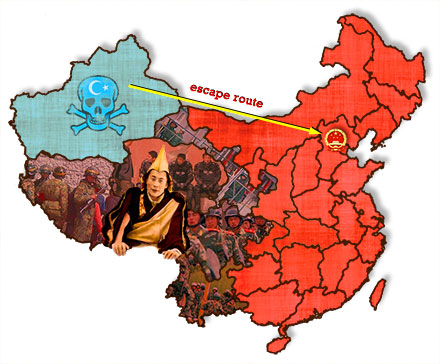
With Chinese troops now carrying out orders to "resolutely crush" protests in areas of the Tibet Autonomous Region, Qinghai, Gansu, Sichuan, and Yunnan, I've realized that Xinjiang is completely cut-off from the loving embrace of the motherland's semi-normal eastern provinces.
Looking in the other direction, to the west we've got people in Pakistan filling soda cans with gasoline to bring down our aircraft, and a smattering of other f#$%ed-up s*!t-hole countries with their own problems. (Greetings, Afghanistan! My apologies to Kazakhstan.)
That's not to mention the threats from within Xinjiang, where swarthy pick-pockets addicted to heroin sell AIDS-laced kebabs to finance their diabolical terrorist master plan. (At least, that's what my Chinese friends tell me.)
Still, I love the place and I've only grown more attached in the 1,138 days since I first arrived in Korla.
Thus, it is with great sadness and a tinge of relief that I announce today my imminent departure from Xinjiang for the smog-shrouded "paradise on Earth" that is Beijing. (At least, that's what my Chinese friends tell me.) The short reason for the change of scene is that I've got a new job, but the longer explanation would have to include my sense of boredom after having spent three years in a small, clean city in the middle of nowhere. It's an interesting nowhere with wonderful people and exotic sights and smells, but still... I've had my fill for now.
I've heard rumors that Beijing is plagued by congestion, pollution, hordes of idiotic expats, and countless blog-writing competitors, yet endowed with art, music, and supermarkets full of cheese. I'm looking forward to seeing for myself and meeting all 20 million or so of my soon-to-be fellow Beijingers.
As for this site, it will continue to focus on Xinjiang and other parts of western China, but will also probably evolve in ways that I can't yet predict. Change is good.
posted March 22, 2008 at 05:05 PM unofficial Xinjiang time | Comments (77)
Video Violence
For those of you without access to YouTube, the Chinese government has made this CCTV video of the riots in Lh@sa available to bloggers. Obviously, this only shows one side of the story with lots of footage of rioters attacking Han and Hui residents of the city, but even so... the scenes of violence captured here don't do the Tibetans any good.
You don't need to speak the language in order to understand how video like this plays on the sensibilities of the Chinese people. They're pissed-off and looking for revenge.
posted March 22, 2008 at 08:25 AM unofficial Xinjiang time | Comments (49)
March 21, 2008
Return of the Lost Hijacking

Remember the Xinjiang hijacking story?
It didn't feel comfortable stealing the limelight from Tibet last week and decided to take a well-deserved vacation, but today it's back with a vengeance:
Separatist militants who tried to attack a Chinese domestic flight early this month came from Pakistan and Central Asia, sources said, adding that the apparent bungled assault had international backing.
Now one source with direct knowledge of the official Chinese inquiry has told Reuters that the chief suspects — a man and a woman — boarded the flight as Pakistani nationals.
"The woman was carrying flammable liquids and evaded security checks by going through the first-class boarding area," said the source, an expert on Xinjiang security threats who has spoken to investigators.
"They were carrying Pakistani passports," the source said. "That does not mean they've concluded they were Pakistani nationals. The passports may have been fake or illegally obtained."
An aviation industry source who asked not to be named said the woman was a young Uighur who was trained by a Pakistan-based militant group, while the man was from Central Asia and in his 30s.
A third suspect, a Pakistani, who masterminded the bungled attack was at large, the aviation industry source said.
I find it a bit odd that all the news agencies are reporting the remarks made by Wang Lequan emphasizing the foreign origins of the hijacking attempt, but only Reuters is coming out with the Pakistan/Central Asia "details" from an anonymous source inside China.
Isn't it nice when anonymous sources back-up unsupported government claims? That's all the evidence I need. Case closed.
China plane attackers "from Pakistan, Central Asia"
By Chris Buckley and Benjamin Kang Lim
20 March 2008
Reuters News
(c) 2008 Reuters Limited
BEIJING, March 20 (Reuters) - Separatist militants who tried to attack a Chinese domestic flight early this month came from Pakistan and Central Asia, sources said, adding that the apparent bungled assault had international backing.
Chinese officials have said the March 7 incident -- in which a plane on its way from the restive, predominately Muslim region of Xinjiang to Beijing abruptly cut short its journey and landed in Lanzhou, a northwest city -- involved a foiled assault by passengers, but they have revealed few details.
The Communist Party chief of Xinjiang, Wang Lequan, said this week that the incident was a failed attack by separatists based abroad seeking an independent Xinjiang.
Now one source with direct knowledge of the official Chinese inquiry has told Reuters that the chief suspects -- a man and a woman -- boarded the flight as Pakistani nationals.
"The woman was carrying flammable liquids and evaded security checks by going through the first-class boarding area," said the source, an expert on Xinjiang security threats who has spoken to investigators.
The source declined to be identified because of the risk of punishment for revealing sensitive information.
"They were carrying Pakistani passports," the source said. "That does not mean they've concluded they were Pakistani nationals. The passports may have been fake or illegally obtained."
But the source also said the woman had been born in Xinjiang and spent many years in Pakistan, where Islamic militants have detonated numerous suicide bombs.
PAKISTANI MASTERMIND AT LARGE
An aviation industry source who asked not to be named said the woman was a young Uighur who was trained by a Pakistan-based militant group, while the man was from Central Asia and in his 30s.
A third suspect, a Pakistani, who masterminded the bungled attack was at large, the aviation industry source said.
The suspects boarded the plane with two canned drinks, the content of which had been replaced with a flammable liquid using a syringe, the second source told Reuters.
The woman failed to light the liquid in the plane toilet, the source said. She aroused the suspicion of crew and other passengers when she came out of the toilet to pick up the second can.
The Chinese Foreign Ministry, reached by telephone, had no immediate comment.
Exiled Uighurs campaigning for an independent country have said China concocted the case to justify intense controls on Uighurs within China.
The Xinjiang official Wang said that suspects had already confessed to planning, directing and initiating the failed attack. But he did not specify what country they operated from.
Xinjiang is home to 8 million Muslim Uighurs, many of whom resent the growing presence and economic grip of Han Chinese. The oil-rich region borders Pakistan and Afghanistan.
A senior Chinese official said recently that extremist Uighurs -- a Turkic people who share linguistic and cultural bonds with central Asia -- were plotting attacks on the Beijing Olympics.
China has said its police shot dead two members of a "terrorist gang" and rounded up 15 others in a raid in January in Xinjiang.
China: Separatists Behind Jet Crash Plot
By ANITA CHANG
Associated Press Writer
20 March 2008
(c) 2008. The Associated Press. All Rights Reserved.
BEIJING (AP) - A failed attempt to crash a commercial jet in China was an act of sabotage by foreigners seeking independence for the country's Xinjiang province in Central Asia, the region's top politician said in comments published Thursday.
A male suspect confessed to masterminding the plot to crash the China Southern flight on March 7, the Xinhua News Agency reported, citing Xinjiang's Communist Party Secretary Wang Lequan.
The failed plot was part of a terror campaign to turn Xinjiang into an independent nation called East Turkestan, the news agency reported.
"According to the investigation, it is now clear that this is a serious sabotage activity carried out by East Turkestan splittists outside of China," Wang said in comments published separately on a provincial government news Web site.
Wang did not specify the nationalities of the three suspects who have been detained in the plot.
Xinjiang is a predominantly Muslim region with a culture that is distinctly different from that of China's ethnic Han majority. Beijing has faced a simmering independence movement among the Uighurs, the region's largest Muslim ethnic group.
China's state media has reported that a 19-year-old woman from the Turkic Muslim Uighur minority group was seized on March 7 after trying to set fire to the Boeing 757 flying from Xinjiang's capital to Beijing.
The unidentified woman had drained soda cans, used a syringe to fill them with gasoline and poured the contents into the bathroom, next to the fuel-filled wings, the Global Times reported.
No one was injured and the plane was diverted to Lanzhou.
Since then, China has increased security at its airports in addition to the stringent security plans being put in place for the Olympic Games in August.
Passengers are now banned from carrying any kind of liquid aboard domestic flights, and passenger and luggage searches are being increased.
posted March 21, 2008 at 02:54 AM unofficial Xinjiang time | Comments (50)
March 20, 2008
Sounds of Xinjiang
UPDATE I've added an option to launch a stand-alone audio module. Just click "detach" below the player in the sidebar.
••••
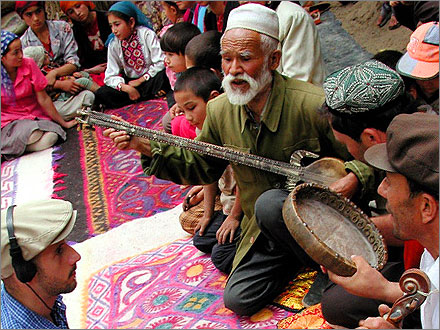
I had meant to write this up last week, but became distracted. Damn you, Dalai clique! Without further ado then, ladies and gentlemen, I'm proud to introduce to you a new feature on this website for your cultural education and aural pleasure....
If you hadn't spotted it yet, I've recently added a flash audio player on the left-hand side of this site... look for the yellow gramophone. By clicking the play button, you'll immediately be surrounded by the music and daily sounds of China's wild, wild west. (If you don't like what you hear at first, skip to the next track by clicking the fast-forward button located in the base of the gramophone.)
I'm a huge fan of the recording work that Fausto Caceres has done in Xinjiang over these past few years, bringing the unique soundscape of the region to those of you living in less mutton-scented locales across the globe. In conjunction with the Royal Oculus & Gramophone Co., Fausto has captured a facet of Xinjiang that can never be expressed through prose or photography. A picture is perhaps worth a thousand words, but each of these audio snapshots is worth at least a thousand pictures.
You may be familiar with Fausto's headphone masterpiece Under a Dim Crescent Moon (Vol. 1 & Vol. 2) and his downloadable mix-tape of Uyghur pop hits, Music Furthest from the Sea.
More recently, Fausto has been making his raw field recordings available for your listening satisfaction... which is where I got the idea to incorporate his work into a random audio player for this site.
I hope you'll all agree that the new feature is a tremendous addition to the site. My only hope is that listening to these recordings will perhaps motivate some of you to take an interest in the cultural heritage that Fausto is working so hard to preserve.
Headphones are recommended for full enjoyment of these live recordings.
posted March 20, 2008 at 01:21 AM unofficial Xinjiang time | Comments (30)
March 18, 2008
Right & Wrong
PHOTOS Those of you looking for evidence of violence against the protesters should take a look at this gallery. Photos are very graphic. Flash and an uncensored connection required.
••••
One question that I haven't heard asked or answered much in Western news media over the past few days: were the actions of the rioters in Lh@sa justified?
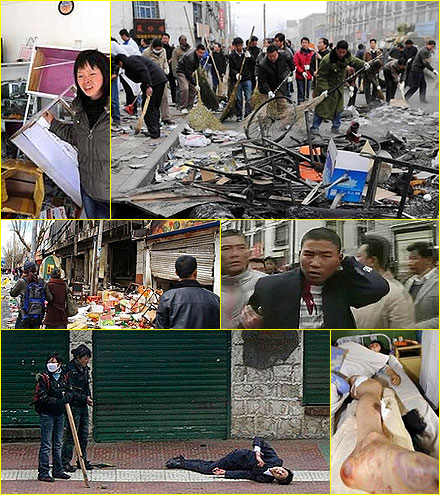
One thing that's become quite clear is that the protests in Lh@sa devolved quickly into an all-out riot — complete with lynchings — while in other places monks seem to have marched more or less peacefully. (At least according to what we know now, which is very little.) Even if half the stuff written in the Chinese media about what Tibetans in Lh@sa did to local Han and Hui residents is true, I'm gonna have to step out on a limb here and say that it's just plain wrong.
From Xinhua:
In the Lh@sa unrest, rioters sliced off people's ears, gored children, clubbed young Tibetans into coma and tried to block nurses from saving an injured 5-year-old.
Tibet regional chairman Qiangba Puncog told a news briefing in Beijing on Monday that 13 innocent civilians were burned or stabbed to death in Friday's riots.
Puncog said that the mobs' actions were extremely brutal. "In one incident, they poured gasoline onto an innocent person and burned the person to death. In another, they knocked over a police officer, and then knifed a fist-size piece of flesh out of the officer's buttocks."
From China Daily:
Some rioters wielded iron rods, wooden sticks and long knives, randomly assaulting passersby, sparing neither women nor children....
Tubdain, a local resident, said he saw a girl in red-clothing who appeared to be an ethnic Han chased and clubbed by six people on the Dosenge Road in the downtown area. "The mobs stoned her head and batted her knees with wooden clubs," said the 50-something Tubdain.
"Blood trickled down her face. She stumbled to the ground, crying and begging the rioters to let her go," he said. "They seemed like a bunch of insane people, growling, stabbing, smashing and burning. It was so hard to believe what I saw."
Jin Hong, a clerk with the Bank of China outlet on Lh@sa's Beijing East Road, suffered a broken pelvis after jumping from the second-floor of the building while trying to protect a cash box.
"About 60 rioters, all young men and women, attacked the bank with rocks and axes and set fire to the building on Friday afternoon."
"I hid in the toilet with three colleagues, but the mobs thronged against the toilet door. I had to jump out of the window," she said.
Now, I know many of you will argue that the explosive anger shown in the riots is a result of years of boneheaded Chinese policy in Tibet and an extremely repressive environment. You're right. And some of you will say, well, there are probably 100 or more Tibetans dead. Maybe. But does that give people the right to cut chunks out of other people's butts? Aren't Tibetans supposed to take the high road, like Gandhi, Dr. Martin Luther King Jr., and... err, Jesus? (How did these three ever come to form a trio in my mind? I'm a Jew for Christ's sake!)
I'm sure Richard Gere and the Beastie Boys didn't fall in love with Tibet for its ancient doctrine of violence and destruction.
Yes, the Chinese have pushed the Tibetan people for years and years, and something's gotta give. Nevertheless, the shameful actions of the rioters in Lh@sa targeting innocent civilians last week should be condemned. Right is right, and wrong is still wrong.
Tibetan religious leaders, specialists condemn violence in Lh@sa
17 March 2008
Xinhua News Agency
(c) Copyright 2008 Xinhua News Agency
Lh@sa, March 17 (Xinhua) -- Tibetologists in Lh@sa have condemned the violence that rocked the Buddhist holy city and killed 13 innocent people Friday.
Cering Doje, deputy director of the religion research institute of the Tibetan Academy of Social Sciences (TASS), said that he questioned the Dalai Lama's humanity and mercy.
"Religion advocates care and mercy, but the reckless rioters attacked hospitals and child-entertainment centers," Doje said, "They seemed to have lost basic humanity, and there was no mercy at all."
Other Tibetologists said that they were outraged by the Dalai Lama's silence in condemning the riot.
In the Lh@sa unrest, rioters sliced off people's ears, gored children, clubbed young Tibetans into coma and tried to block nurses from saving an injured 5-year-old.
Tibet regional chairman Qiangba Puncog told a news briefing in Beijing on Monday that 13 innocent civilians were burned or stabbed to death in Friday's riots.
Puncog said that the mobs' actions were extremely brutal. "In one incident, they poured gasoline onto an innocent person and burned the person to death. In another, they knocked over a police officer, and then knifed a fist-size piece of flesh out of the officer's buttocks."
On Saturday, the Dalai Lama charged that Tibet was being ruled by terror, which Tibetan officials rejected as "downright nonsense".
Basang Wangdu, another Tibetologist and a council member of the International Society of Tibetology, said that people could see from Friday's riots that the Dalai Lama had not ceased his secessionist activity but added that these attempts "will not succeed."
While condemning the riots, others called for solidarity among all ethnic groups at what they said was a critical time.
"Tibetans and Hans share a common cultural background. We have links that cannot be severed," said Cering Gyaibo, the head of TASS' religion research institute.
"At this critical time, we need to cherish ethnic solidarity and muster courage to protect territorial integrity and ethnic harmony," he said.
The religious researchers' comments came as the latest condemnations against the violence. The 11th Panchen Lama, Gyaincain Norbu, said on Sunday that the violence in Lh@sa ran counter to Buddhism tenets.
Living Buddhas in Tibet also voiced their opposition. Ngawang Daindzin, a living Buddha, said that "the rioters who wore cassocks were no real monks at all. What they did is completely against Buddhism codes."
Local Tibetans, who survived the violence, said they were deeply hurt. A retired worker, Cering Yangzom, said that "it had been repeatedly proven that the Dalai Lama and his followers could not separate Tibet from China, and such savage acts only hurt the feelings of many Tibetans and only revealed a true picture of the Dalai Lama."
Fears and tears in holy plateau city
China Daily
Updated: 2008-03-17 06:36
Lh@sa - Dense smoke blanketed the sky as burning cars emitted an irritating smell amid the wailing of bloodshed.
A Tibetan teacher said she couldn't believe her eyes.
"I've never seen such cruelty before. How can anyone do something like this?" asked Zhayung, who works at the No 1 primary school in Lh@sa. Her voice was still shaky and her complexion tinged with fear and sheer shock.
The school she worked at was among a range of targets damaged by saboteurs in the Tibetan capital on Friday afternoon.
Vandals carrying backpacks filled with stones and bottles of inflammable liquids smashed windows, set fire to vehicles, shops and restaurants along their destructive path.
Some rioters wielded iron rods, wooden sticks and long knives, randomly assaulting passersby, sparing neither women nor children.
"Classes were cancelled," Zhayung said. "I managed to escape from the school and hide in the building across the street, but some of my colleagues were stranded in the school for the whole night until police came to their rescue."
For many Lh@sa residents such as Zhayung, March 14 stopped being just another Friday - it was a day when the capital was left in chaos after an outburst of beatings, vandalism, looting and burning, which officials say was "masterminded by the Dalai clique".
The Tibet regional government said on Saturday at least 10 people were killed, including several from burns and gunshot wounds. Police managed to rescue more than 580 people, including three Japanese tourists, from attacks.
Sources told Xinhua that rioters had ransacked at least 100 shops. The four-storey Landun shopping mall in the old city center, which sold children clothes, was engulfed in flames sparked by the horde.
Its owner, Ye Danping, and her 20 Tibetan employees were lucky to survive after scrambling onto the roof of the building.
Nightmares
As tensions began to ease on Saturday, residents in the traditionally tranquil plateau city recalled the nightmares they went through.
Rawang, a Tibetan clothes vendor in downtown Lh@sa, sighed at the dreary scene, once the site of bustling commerce. "It was once a shopping haven, but now it's all deserted, like a hell." His shop was burnt to the ground. "Losses were grave. These people were crazy," he said.
Tubdain, a local resident, said he saw a girl in red-clothing who appeared to be an ethnic Han chased and clubbed by six people on the Dosenge Road in the downtown area. "The mobs stoned her head and batted her knees with wooden clubs," said the 50-something Tubdain.
"Blood trickled down her face. She stumbled to the ground, crying and begging the rioters to let her go," he said. "They seemed like a bunch of insane people, growling, stabbing, smashing and burning. It was so hard to believe what I saw."
Jin Hong, a clerk with the Bank of China outlet on Lh@sa's Beijing East Road, suffered a broken pelvis after jumping from the second-floor of the building while trying to protect a cash box.
"About 60 rioters, all young men and women, attacked the bank with rocks and axes and set fire to the building on Friday afternoon.
"I hid in the toilet with three colleagues, but the mobs thronged against the toilet door. I had to jump out of the window," she said.
Saved by Tibetan folks
In response the regional government imposed traffic bans and increased the police presence to ensure social security.
For the many ethnic Hans who were lucky enough to survive the disaster, they said it was the Tibetan folks who saved them.
Sun Pingjiang, an ethnic Han and owner of a Titan-styled accessories store near the R@mogia monastery, said he owed his life to an elderly Tibetan woman who saved him from bleeding to death.
"I was attacked by more than 30 people about my age when I was running from my store to my friend's. The mobs beat and stabbed me," said the 26-year-old.
"When I finally managed to run away, I stumbled along and knocked at every door I could for help. A Tibetan woman in a chessboard game room came to my rescue," he said. "She took me in and called the emergency number 120 when the streets calmed down," he said.
Sun is being treated for leg and back injuries at the General Hospital of Tibet Military Command.
During Friday's riot, many local Tibetans came to the help of ethnic Hans.
Ma Ruixia, a Han woman who owns clothes and souvenir shops on Barkor Street in the downtown, said her establishments were attacked twice by the mob. She survived with the help of her Tibetan landlord and neighbors.
"Around 2 pm, Friday, I heard people shouting in the yard that rioters were coming and we needed to take shelter," she recalled.
"My Tibetan neighbors faced up to the mob and pleaded with them not to ravage my stores," she said. "I really didn't know what was going on out there. It was horrible."
Ye, who came to Lh@sa 15 years ago from coastal Zhejiang province, said she would stay on in Lh@sa, because she took this place as her second hometown.
"I wish the government would properly handle the incident and make Lh@sa a safe place again," she said.
posted March 18, 2008 at 07:42 AM unofficial Xinjiang time | Comments (172)
March 17, 2008
More Labr@ng Photos
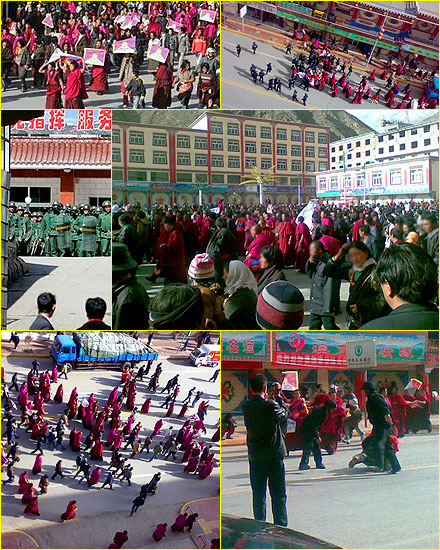
Some more images from the protests at the Labr@ng Monastery in Xi@he, Gansu. Also, I've found some cell phone video posted at Ph@yul.com of the Xi@he protests and copied it over to YouTube. Of course, both sites are blocked in China, so many of you will be sh*t out of luck.
Difficult to tell what is going on exactly in the video as the quality is pretty crap, but the protesters appear to be throwing objects at security forces who wade into the crowd. Or maybe not. You be the judge.
In other news, the Internet is completely f$%@ed in China at the moment. Guess why?
P.S. I took bwcat's advice and slightly distorted some of the unmentionable keywords that may have been getting this site blocked. Voila! Things are working just fine now.
posted March 17, 2008 at 12:18 AM unofficial Xinjiang time | Comments (112)
March 16, 2008
The Streets of Labr@ng
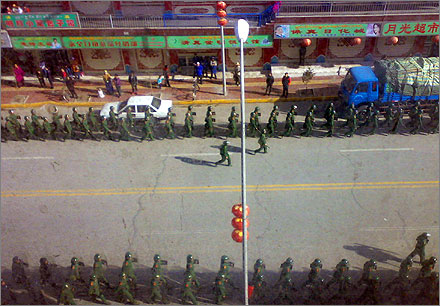
While a heavy crackdown seems to have calmed things down a bit in Lh@sa, reports out of Xi@he, Gansu indicate that protests and clashes with Chinese troops may still be going on there. From The Observer:
Security forces, monks and lay people are in an extraordinary standoff in the tiny Buddhist town of Xi@he, nestled almost 3,000m above sea level in the mountains of Gansu province. Outside the Tibetan autonomous region but regarded by Tibetans - who make up half the population - as part of the kingdom, it has become the scene of fierce protests against the authorities.'
Of course, we are very afraid,' said a monk. 'We do not know what is going to happen. But it will carry on because we want our freedom. The young monks want the D@lai Lama to return.'
They say this is the highest level of unrest in Xi@he since the 1958-59 uprising when, say Tibetans, up to two million were killed across the country and in other Chinese provinces.
Many here are simply too frightened to talk. Eyewitnesses said as many as 30 troop carriers of paramilitary police arrived late on Friday night after up to 3,000 monks and lay people marched from the renowned Labr@ng monastery to government offices, demanding Tibet's independence.
You can read the full article below, and see a lovely gallery of photos I shot while visiting Labr@ng Monastery in more peaceful times here.
Batons and tear gas as Tibetan unrest spreads beyond borders
CHINA'S SHOW OF FORCE: In this remarkable dispatch from Xiahe, Tania Branigan gives the first account of growing tension and violence between protesters and state forces in China
16 March 2008
The Observer
© Copyright 2008. The Observer. All rights reserved.
Tibetans in Xiahe were in an uneasy truce with Chinese troops yesterday. About 2,000 paramilitaries are believed to be in the Buddhist town, where 3,000 monks and lay people have protested.Photograph by Dan Chung
TWO ROUNDS split the air. There was a second's silence. And then the gaudy prayer wheels began to turn again and pilgrims resumed their slow pace around the temple.
Another crack - then a fourth, a fifth. Tibetans and monks scattered along the street. Tear gas and the clatter of riot shields rose into the air as the paramilitaries regrouped around their armoured personnel carrier.
At street corners clusters of children, monks, and men and women in traditional Tibetan dress peered from behind rough brick-and-mud walls, anxiously watching events unfold.
And then, each time the noise died down, they began to creep back towards the line of armed police around the government buildings. All the time
the pilgrims continued their rituals, unperturbed.
Security forces, monks and lay people are in an extraordinary standoff in the tiny Buddhist town of Xiahe, nestled almost 3,000m above sea level in the mountains of Gansu province. Outside the Tibetan autonomous region but regarded by Tibetans - who make up half the population - as part of the kingdom, it has become the scene of fierce protests against the authorities.
'Of course, we are very afraid,' said a monk. 'We do not know what is going to happen. But it will carry on because we want our freedom. The young monks want the Dalai Lama to return.'
They say this is the highest level of unrest in Xiahe since the 1958-59 uprising when, say Tibetans, up to two million were killed across the country and in other Chinese provinces.
Many here are simply too frightened to talk. Eyewitnesses said as many as 30 troop carriers of paramilitary police arrived late on Friday night after up to 3,000 monks and lay people marched from the renowned Labrang monastery to government offices, demanding Tibet's independence.
Residents with mobile phones showed video clips of thousands of chanting Tibetans waving banners as they marched through the streets. 'There were a lot more people yesterday. It was a religious day, so people came to the temple. But about one o'clock it somehow became a protest,' said a monk.
'There were a lot of people, maybe 50, with Tibetan flags and big pictures of the Dalai Lama with "Free Tibet" written on them. Then some of the pro-communist lamas at one of the temples told every one they should leave, and it began to disperse, at about half-four.
'But today it started again. I saw one protester beaten with batons by the police very severely - he had blood coming from his head and all over his face: his nose, mouth, everywhere.
'He hadn't done anything,' said the monk. 'It was just because he was nearby. The crowd managed to get him away, but then they started throwing stones because they were angry. I heard they caught two monks today, too. They were very young - no older than 20. If the government doesn't release them I think there will be more trouble tomorrow.'
Another monk estimated that the total number of paramilitaries had at least doubled overnight to 2,000 or more in a town of just 150,000 inhabitants, adding: 'I myself saw more than 10 armed vehicles arrive today.'
It is a very modern battle of wills. Labrang monastery dates from the early 18th century. But purple-robed monks, with trainers on their feet and fleeces beneath their woollen shawls for warmth, chatter on mobile phones and complain that they have been banned from internet cafes for the past year as the government has stepped up restrictions on religious life. They say that their movements are more restricted and
that in recent years monks who were caught pasting 'Free Tibet' posters on the wall have been severely beaten and imprisoned.
But they appear to know little about the protests in Lhasa and elsewhere - perhaps because they are well aware that mobiles are monitored.
As night falls a strained quiet prevails in the town. Few dare venture on to the mud streets. So far the paramilitaries appear to be showing restraint, concentrating on defending official buildings from the crowd. But people here are bracing themselves for retaliation.
The population of Xiahe is roughly 45 per cent Tibetan, 45 per cent Han Chinese, and 10 per cent Hui Muslim. Unlike in Lhasa, there is no sign as yet that anger at the government is turning into ethnic conflict.
But one resident said: 'I feel like there are more Han than Tibetans. There are 700 children in the Chinese school, but only 300 children in the Tibetan one.'
posted March 16, 2008 at 12:30 PM unofficial Xinjiang time | Comments (57)
March 15, 2008
Martial Law in Lh@sa
UPDATE I was able to record and upload a short report from CCTV (click here) about the rioting in Lh@sa. Good footage of general mayhem and monks smashing stuff. You'll need a proxy if you're inside China, as YouTube is once again behind the Great Firewall. It looks like even I'm being blocked intermittently.
••••
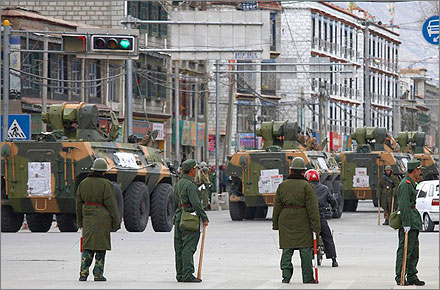
A convoy of armoured personnel carriers (APC) travel through the streets of Lh@sa, Tibet March 15, 2008. Tibet's top government official Qiangba Pingcuo denied on Saturday that the regional capital Lhasa was under martial law.
Photo and caption via Reuters. Also, YouTube appears to be blocked at the moment... and kebabs give you AIDS.
posted March 15, 2008 at 02:49 PM unofficial Xinjiang time | Comments (32)
Tibet's Burning
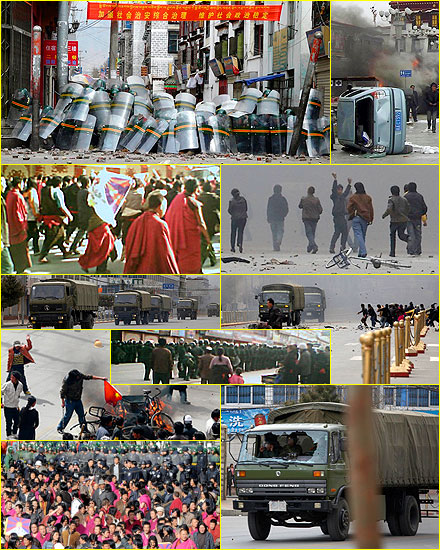
Sabotage in Lh@sa masterminded by Dalai clique
15 March 2008
Xinhua News Agency
LHASA, March 14 (Xinhua) -- The government of Tibet Autonomous Region said Friday there had been enough evidence to prove that the recent sabotage in Lhasa was "organized, premeditated and masterminded" by the Dalai clique.
The violence, involving beating, smashing, looting and burning, has disrupted the public order and jeopardized people's lives and property, an official with the regional government said.
The sabotage has aroused indignation of and is strongly condemned by the people of all ethnic groups in Tibet, he said in an interview with Xinhua.
"The relevant departments of the regional government are taking effective measures to properly handle the incident in line with the law," he said.
"We are fully capable of maintaining social stability of Tibet and safeguarding the safety of the people of all ethnic groups in Tibet and their properties," said the official.
"The plots by the very few people against the stability and harmony of Tibet run counter to the will of the people, and are doomed to fail," he said.
Shops were set on fire in violence in downtown Lhasa on Friday afternoon. There were injuries reported in the violence and the injured have been hospitalized.
Witnesses said a number of shops along two main streets in this capital city and around J*khang Temple, Ram*gia Monastery, Ch*msigkang Market were set on fire around 2 p.m., sending out dense smoke. Some vehicles were burnt down.
All shops close to the J*khang Temple and Ram*gia Monastery shut down business.
According to sources, the public order has basically returned normal in downtown Lh@sa by press time, with electricity and telecommunication resumed in many areas.
••••
And that's the official word from Beijing.
posted March 15, 2008 at 12:31 AM unofficial Xinjiang time | Comments (85)
March 14, 2008
Blitzkrieg!

"A Uyghur woman with a can of gasoline, a Han Chinese man with a bomb strapped to his chest, Steven Spielberg, Björk, and a Tibetan monk walk into a bar in Beijing..."
Perhaps the beginning of a not-so-funny joke, but an accurate gauge of a security atmosphere in China that is becoming very tense, very quickly. What I want to know: who is coordinating these attacks defying the united will of the 56 ethnic groups of my adopted motherland? Who is the Olympic-hating ringleader behind the 'three evil forces'? Reveal yourself!
Another thing I want to know: why didn't any of you tell me that Björk has been running around on tour for almost a year now wearing Uyghur-style Atlas Silk? I only happened to notice it myself because of all the hubbub over the "Tibet, Tibet" incident at her recent Shanghai concert. How awesome is that? (The Uyghur threads, that is... not her foolish attempt at extreme splittist separatism.)
Peking Duck has a round-up of the various sh*t hitting the fan in Tibet. And with the sh*t coming fast and furious from all directions like this, I think we can expect everything to be covered in a thick layer for quite some time.
If anyone would care to complete that joke above, please, be my guest.
UPDATE Just received an email from the State Department:
 U.S. Embassy Warden Message
U.S. Embassy Warden Message
Reports of Violence in Tibet
This Warden Message is to advise Americans of reports of rioting in Lh@sa, Tibet. Some U.S. news media are reporting violence associated with protests in the city of Lh@sa. The Embassy has received first-hand reports from American citizens in the city who report gunfire and other indications of violence.
American citizens in Tibet and especially in Lh@sa are advised to avoid areas where demonstrations are taking place. U.S. citizens in Lhasa should seek safe havens in hotels and other buildings and remain indoors to the extent possible. All care should be taken to avoid unnecessary movement within the city until the situation is under control.
Americans who were planning on travel to Tibet are advised to defer travel at this time.
Nothing really new in there, but a warning in my inbox from Condoleezza Rice somehow makes things seem more ominous.
posted March 14, 2008 at 09:37 AM unofficial Xinjiang time | Comments (48)
March 13, 2008
Caption Contest #5
AND THE WINNER IS... Lucas, with a caption that I enjoyed particularly this week as I abandoned coverage of Xinjiang to concentrate on the tumult in Tibet:
NUR: How could you choose this week to stage our triumphant victory over the Muslim savages? You did realize that Tibetans all over Asia were staging protests at the same time, RIGHT?
WANG: THEY WERE!?!? Shit, our 15 minutes of fame are over, there goes my chances of making the BBC Front Page.
Ouyang's "who farted?" joke was the runner-up.
••••
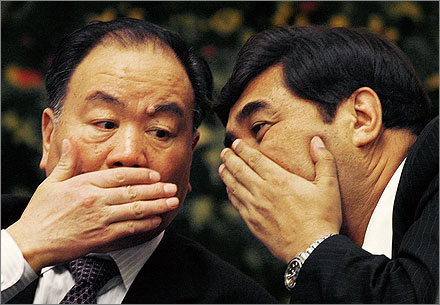
Must... resist... the urge to... CAPTION CONTEST!
Yet resistance is futile. With the exciting and terrifying events of the past week here in Xinjiang, even the most simple-minded of my many readers should be able to come up with a side-splitting caption to go along with this photo.
The picture above shows Xinjiang Communist Party secretary Wang Lequan (left) and recently annointed Xinjiang Governor Nur Bekri (right) whispering to each other during a meeting at the National People's Congress a few days ago. You fill in the blanks.
This contest ends at midnight on Friday, March 21st. May the 'three evil forces' be with you!
posted March 13, 2008 at 12:06 AM unofficial Xinjiang time | Comments (34)
March 12, 2008
Drunken Pictography

Of all the wonderful highway signs in China, this is definitely one of my top ten favorites.
The transformation of the alcohol character 酒 (jiǔ) into a crashing vehicle ejecting severed heads and an empty beer bottle — hey, that's what it looks like to me — is one of the crowning achievements in the burgeoning field of Sino-pictographic morphology. (The 'booze car' is soooo much better than the 'running man' logo for the Beijing Olympics.)
Sure, this has nothing to do with Xinjiang (except for the Uyghur script on the sign), but I thought some of you might be amused nonetheless.
posted March 12, 2008 at 01:20 AM unofficial Xinjiang time | Comments (44)
March 09, 2008
And So It Begins...
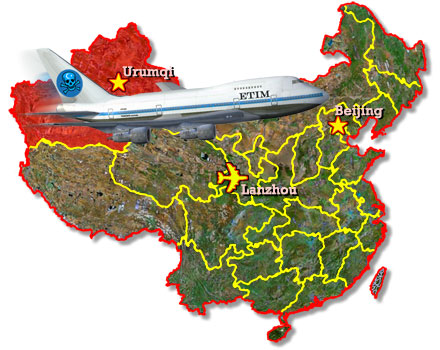
I'm not sure if this is a case of the doomsayers being right or one of those "if you build it they will come" scenarios. The it in this case being the perceived threat of Uyghur terrorism at the Beijing Olympics, and they being actual terrorists with their religious zeal, grenades, knives, and poorly executed diabolical plans for aviation disaster.
From the AP wire today:
Chinese police killed alleged terrorists plotting to attack the Beijing Olympics, while a flight crew managed to prevent an apparent attempt to crash a Chinese jetliner in a separate case just last week, officials said Sunday.
Wang Lequan, the top Communist Party official in the western region of Xinjiang, said materials seized in a January raid in the regional capital, Urumqi, had described a plot with a purpose "specifically to sabotage the staging of the Beijing Olympics."
Wang cited no other evidence and earlier reports on the raid had made no mention of Olympic targets.
In a bold dare reminiscent of President Bush's "bring 'em on" fiasco, Wang went on to practically dare terrorists to try a strike in Beijing this summer: "These guys are fantasizing if they think they can disrupt the Olympics. They don't have the strength!"
Gulp! Have fun at the Opening Ceremony.
On another note, I'm not calling anyone a liar, but that's three foiled terrorist attacks in the past year that have been supported by exactly zero pieces of public evidence (and very few details at all). It's time to start showing some cards if China wants other countries to line up behind them for their pre-Olympics anti-terrorism frenzy.
UPDATE The New York Times has come up with some sketchy details/online rumors regarding the incident:
One person with information about the incident said a Uighur woman apparently smuggled three containers of gasoline onto the flight. The person said that she took the containers into the bathroom and was later apprehended by members of the flight crew.
That account seemed consistent with a Friday posting on a Chinese Internet chat room. The messages discussed a landing in Lanzhou and said that it had been discovered in mid-flight that people had brought gasoline on board and that four Uighurs had been led away after the plane landed.
They appeared to be a first-hand account from a passenger sending messages via a hand-held device from the Lanzhou airport, but that could not be confirmed. nor could the identity of the person sending the messages.
Read the full articles below.
China Reports Suspected Terrorist Activity
By JIM YARDLEY and JAKE HOOKER
Published: March 10, 2008
BEIJING — A Chinese passenger jet that departed Friday morning from the heavily Muslim region of Xinjiang was forced to make an emergency landing after the flight crew apprehended at least two passengers who authorities say intended to sabotage the airplane, state media reported Sunday.
A senior Chinese official also said Sunday that a police raid last January against a group in Xinjiang suspected of planning terrorist acts uncovered proof that the group was plotting an attack on the coming Beijing Olympics.
Terrorism is usually not a significant threat in China, where the authoritarian government takes an unflinching approach toward maintaining social stability. But Chinese security officials are very concerned that terrorism poses a serious risk as Beijing prepares to be the host for the Olympic Games in August.
The airplane incident came in the same week that a man armed with dynamite hijacked a private bus filled with Australian tour operators who were sightseeing in the city of Xian. A police sniper later killed the man, and few details have been released about him or his motives. None of the hostages were wounded.
On Sunday, Wang Lequan, the Communist Party chief in Xinjiang, took a hard stance, saying that China would strike the “three evil forces” of terrorists, separatists and extremists.
“We are prepared to strike them when the evil forces are planning their activities,” Mr. Wang said, according to Xinhua, the country’s state-run news service.
Xinjiang is a vast northwestern region that is home to China’s population of 8.3 million Uighurs, a Turkic Muslim group with linguistic and cultural ties to neighboring central Asia. The region has long had tensions over cultural aspirations by some Uighurs for an independent state. In the past, China has blamed Uighur separatists for terrorist actions. Human rights groups have accused China of overstating any terrorist threat as a pretext for cracking down on the Uighurs.
In January, the Chinese police attacked what the authorities said was a terrorist gang in Urumqi, the capital city of Xinjiang. Two people were killed and 15 others arrested. Initially, few details were released about the raid.
On Sunday, Mr. Wang said investigators had found knives, axes and books about terrorism in the raid. He said other materials suggested the group planned an Olympic attack, although no specifics were provided.
“Obviously, the gang had planned an attack targeting the Olympics,” Mr. Wang told Xinhua in an interview conducted during the meeting of the National People’s Congress, the country’s Communist Party-controlled legislature.
Mr. Wang said the gang had ties to the East Turkestan Islamic Movement, a separatist group designated as a terrorist organization by the United States and the United Nations.
The thwarted airplane attack was also disclosed on Sunday. Nur Bekri, chairman of the Xinjiang Uighur Autonomous Region government, told state media that “some people were attempting to create an air disaster.”
The incident occurred on a China Southern flight that departed Friday morning at 10:35 from Urumqi, heading for Beijing. But the plane was diverted to the city of Lanzhou after an onboard incident. A China Southern employee in Lanzhou confirmed that the airplane had been diverted to Lanzhou. The employee said the airport was initially told that the diversion was necessary because of “traffic control” problems.
State media provided only a few details, noting that “the attackers were stopped in time by the air police, and all the passengers and crew members are safe.”
Mr. Bekri suggested that more than one person was involved but declined to provide specifics, telling Xinhua that the authorities are investigating “who the attackers are, where they are from and what’s their background.
“But we can be sure that this was a case intending to create an air crash,” he said.
A China Southern employee at the Lanzhou airport confirmed that the airplane had been diverted to the city and that the incident had been handled by public security officers. The diversion was initially described as necessary because of “traffic control,” the employee said.
One person with information about the incident said a Uighur woman apparently smuggled three containers of gasoline onto the flight. The person said that she took the containers into the bathroom and was later apprehended by members of the flight crew.
That account seemed consistent with a Friday posting on a Chinese Internet chat room. The messages discussed a landing in Lanzhou and said that it had been discovered in mid-flight that people had brought gasoline on board and that four Uighurs had been led away after the plane landed.
They appeared to be a first-hand account from a passenger sending messages via a hand-held device from the Lanzhou airport, but that could not be confirmed. nor could the identity of the person sending the messages.
Zhang Jing contributed research.
China Says Terrorists Targeted Olympics
By THE ASSOCIATED PRESS
Published: March 9, 2008
Filed at 8:38 a.m. ET
BEIJING (AP) -- Chinese police killed alleged terrorists plotting to attack the Beijing Olympics, while a flight crew managed to prevent an apparent attempt to crash a Chinese jetliner in a separate case just last week, officials said Sunday.
Wang Lequan, the top Communist Party official in the western region of Xinjiang, said materials seized in a January raid in the regional capital, Urumqi, had described a plot with a purpose ''specifically to sabotage the staging of the Beijing Olympics.''
''Their goal was very clear,'' Wang told reporters in Beijing.
Wang cited no other evidence and earlier reports on the raid had made no mention of Olympic targets.
Speaking at the same meeting, Xinjiang's governor said a flight crew prevented an apparent attempt to crash a China Southern flight from Urumqi on Friday. Nur Bekri did not specifically label the incident a terrorist act, saying it remained under investigation. No passengers were injured and police were investigating, he said.
China has ratcheted up anti-terror preparations ahead of the August Games, with the nation's top police official last year labeling terrorism the biggest threat facing the event.
Police found guns, homemade bombs, training materials and ''extremist religious ideological materials'' during the Jan. 27 raid in Urumqi, in which two members of the gang were killed and 15 arrested, according to earlier reports.
Chinese forces have for years been battling a low-intensity separatist movement among Xinjiang's Uighurs, a Turkic Muslim people culturally and ethnically distinct from China's Han majority. Iron-fisted Chinese rule has largely suppressed the violence, however, and no major bombing or shooting incidents have been reported in almost a decade.
Wang said the group had been trained by and was following the orders of a Uighur separatist group based in Pakistan and Afghanistan called the East Turkestan Islamic Movement, or ETIM. The group has been labeled a terrorist organization by both the United Nations and the United States. East Turkestan is another name for Xinjiang.
China says its main terror threat comes from ETIM. Although the group is not believed to have more than a few dozen members, terrorism experts say it has become influential among extremist groups using the Internet to raise funds and find recruits.
Wang said security forces would take pro-active measures to crush terrorism, religious extremism, and separatism.
''These guys are fantasizing if they think they can disrupt the Olympics,'' said Wang, known for his hardline stance on crushing dissent. ''They don't have the strength.''
Few details were available about the alleged attempt to crash the China Southern Airlines flight that left Urumqi at 10:35 a.m. on Friday.
Bekri, the governor of the Xinjiang region, indicated that more than one person was involved, but did not specify who was suspected to be behind the attempt, saying it remains under investigation.
''From what we presently know, this was an attempt to crash the plane,'' Bekri said.
Bekri said the crew responded and brought the plane to an emergency landing in the western city of Lanzhou at 12:40 p.m. No passengers were injured and police were investigating, he said.
He said it continued to its original destination, Beijing, after about one hour.
A man who answered the phone at China Southern's Urumqi office said he the incident was under investigation and he had no further details. He hung up without giving his name.
posted March 09, 2008 at 10:47 PM unofficial Xinjiang time | Comments (115)
March 08, 2008
Xinjiang News for 2008.03.09
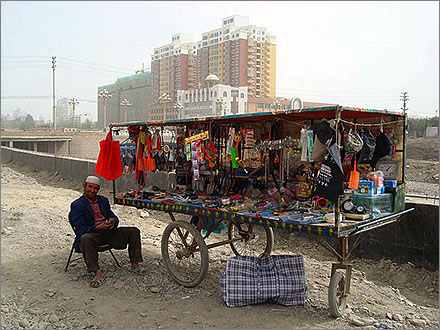
 I keep track of Xinjiang-related news on a daily basis for the website, but sometimes weeks can go by without a single story that really piques my interest. Then there are times like today when everything seems hilarious, terrifying, or both...
I keep track of Xinjiang-related news on a daily basis for the website, but sometimes weeks can go by without a single story that really piques my interest. Then there are times like today when everything seems hilarious, terrifying, or both...
The Guardian: London-Urumqi Bus Service to Begin
BuddhaBus will take just 16 days to travel the 8,000km from Victoria Station in London to Urumqi in Xinjiang province, China, allowing only one night's stopover in most places.
The marketing bumf claims the journey will be "the perfect antidote to the stresses of the modern world". Indeed the bus's name suggests this will be a sort of zen-like escape from the horrors of modern travel.
I beg to differ. (link)
China Daily: Another Terrorism Smackdown in the Works?
Xinjiang's top political and military leaders have pledged a further crackdown against East Turkestan Islamic Movement (ETIM) terrorists in a bid to safeguard the security and prosperity of the region.
Nur Bekri, the newly elected chairman of the Xinjiang Uygur autonomous region, said on Friday that the forces of terror, separatism and extremism had recently become more active in planning violent activities.
"Although we have achieved some initial success, we will never slacken in our fight against these evil forces," he told China Daily. (link)
Xinhua: Hu Jintao Prescribes Cash and Catch Phrases
While joining the Xinjiang delegation to the parliament in panel discussion, Hu urged Xinjiang officials and people to grasp the opportunities brought forth by the strategy of large-scale development of the western region to enhance stability and prosperity, and to ensure a stable border area by making local people rich.
He urged officials to take new steps to achieve sound and rapid economic development, ensure people's wellbeing, improve their lives, enhance social harmony, improve work related to religious and ethnic affairs, and make more efforts in strengthening unity among ethnic groups. (link)
I can just see the propaganda poster now: a smiling Uyghur with gold teeth and a friendly local PSB officer chatting and sharing sunflower seeds standing beside a pimped-out VW Santana over the slogan, "Ensure a Stable Border Area by Making Local People Rich".
By the way, I'm not sure how many of you have already seen Joshua Kucera's five-part series on Xinjiang over at Slate, but be sure to read part three for the writers account of an interview and tour I gave him that I really, really hope won't get me booted out of the country or banned once and for all. Sigh.
A bus too far?
Today, tickets go on sale for an express coach service from London to China. Is BuddhaBus the future for low-impact long-haul travel or the journey from hell?
Anita Sethi
8 March 2008
The Guardian
© Copyright 2008. The Guardian. All rights reserved.
I've broken out in a cold sweat at the news of BuddhaBus. Last year, I joined OzBus, the first London-Sydney bus trip. It was an exhilarating three-month journey through some of the world's less trammelled landscapes, during which I saw places I didn't even know existed and certainly wouldn't have seen from a plane, but it was a hell of bumpy ride.
BuddhaBus will take just 16 days to travel the 8,000km from Victoria Station in London to Urumqi in Xinjiang province, China, allowing only one night's stopover in most places.
The marketing bumf claims the journey will be "the perfect antidote to the stresses of the modern world". Indeed the bus's name suggests this will be a sort of zen-like escape from the horrors of modern travel.
I beg to differ. By the time we got to Kathmandu (42 days) many OzBus passengers were so frazzled they could have done with some serious meditation before reboarding the bus.
"Regular breaks and stopovers" are promised by BuddhaBus, ensuring passengers "are able to appreciate the highlights of the trip at their leisure" in places such as such as Warsaw, Moscow and Almaty. In reality, covering an average of 800km a day means arriving in cities at rush hour, ensuring ample time to "relax and reflect" while sitting in a traffic jam, finally reaching a hostel at sunset, then departing the next morning before sunrise. Some places won't even be seen in the light of day.
BuddhaBus also promises to inspire "a renewed interest in the experience of travel, an experience lost in the sterile environment of airports". But unless the coach travels at lightening speed, or extends its 16 days to 60, passengers will get to know the inside of their coach far better than the countries they travel through. The most regular breaks will be loo breaks, so they'll become connoisseurs of service stations the world over, from the plush to the makeshift, as well as the vast tracks of roadside where it'll be knickers-round-ankles relief watched on by grazing cows and companions who might get a laugh out of snapping your bare bum.
Diversions and delays caused by rubble, rebels and roads which have been washed away are all highly likely. Those brave souls who embark on this epic journey should pack plenty of patience and flexbility, as they may find the bus is forced to take a detour past their would-be highlight. "Catch up days" can entail overnight driving, which means seeing the world through very bleary eyes.
Some will find it heaven to be with a ready-made set of new friends every minute of their waking and sleeping lives. Others will leave feeling that, to paraprhase Sartre, hell is other people on a bus.
* The first BuddhaBus departs London Sept 6, arriving in Urumqi 16 days later: pounds 795 single, pounds 1,295 return, including camping and refreshments but not meals or hotels. buddhabus.co.uk.
NO LET-UP IN FIGHT AGAINST 'FORCES OF TERROR'
By Xing Zhigang
8 March 2008
China Daily
Copyright 2008 China Daily Information Company. All rights reserved.
Xinjiang's top political and military leaders have pledged a further crackdown against East Turkestan Islamic Movement (ETIM) terrorists in a bid to safeguard the security and prosperity of the region.
Nur Bekri, the newly elected chairman of the Xinjiang Uygur autonomous region, said on Friday that the forces of terror, separatism and extremism had recently become more active in planning violent activities.
"Although we have achieved some initial success, we will never slacken in our fight against these evil forces," he told China Daily.
"We should stay on high alert all the time to crush any attempt to damage Xinjiang's development and stability."
Bekri, a deputy to the 11th NPC, made the remarks on the sidelines of the ongoing annual session of the top legislature.
He acknowledged that terrorism, separatism and extremism remain the greatest threats to the region's development.
"But we have the capability and confidence to safeguard our country's territorial integrity and ethnic unity," he said.
Xinjiang, with a population of more than 20 million, including 12 million people from ethnic minorities, accounts for about one-sixth of China's territory and is three times the size of France.
The region, which borders central Asia, has been suffering frequent sabotage from separatist forces.
Hou Xiaoqin, political commissar of the Xinjiang Armed Police Regiment, said the major threat comes from ETIM, which was listed as a terrorist group by the United Nations and the United States in 2002.
"As the country's front line in battling terrorism and separatism, Xinjiang's anti-terrorism fight is of crucial importance to the stability of the whole country," the senior officer said.
ETIM has been responsible for more than 200 violent incidents, including explosions, assassinations, arson, poisonings and assaults in Xinjiang and other areas between 1990 and 2001, killing 162 people and injuring 440.
The Ministry of Public Security placed ETIM, which is pursuing an independent "Eastern Turkistan", on a list of "East Turkistan" terrorist organizations in 2003.
Mamat Hasan, deputy political commissar of Xinjiang Military Command, said ETIM, which has links with foreign terrorist groups, is "manipulated and controlled by some foreign forces hostile to China".
Early last year, Xinjiang police raided an ETIM terrorist training camp, killing 18 terrorists and arresting 17 others. The camp was located on the Pamir Plateau in Xinjiang, near the borders of Pakistan, Afghanistan and Kyrgyzstan.
A large amount of evidence, including items seized in that raid, showed that the ETIM is connected with international terrorist forces, the Ministry of Public Security later said.
Hou said his troops have boosted their anti-terror capabilities by staging more anti-terror and anti-hijacking drills, and installing more advanced anti-terror equipment.
He warned that any terrorist activities aimed at sabotaging Xinjiang's stability will be dealt "a deadly blow".
Chinese president calls for scientific development, social harmony in Uygur region
8 March 2008
Xinhua News Agency
(c) Copyright 2008 Xinhua News Agency
BEIJING, March 8 (Xinhua) -- Chinese President Hu Jintao on Saturday called on people in the northwestern Xinjiang Uygur Autonomous Region to make new achievements in scientific development and social harmony.
While joining the Xinjiang delegation to the parliament in panel discussion, Hu urged Xinjiang officials and people to grasp the opportunities brought forth by the strategy of large-scale development of the western region to enhance stability and prosperity, and to ensure a stable border area by making local people rich.
He urged officials to take new steps to achieve sound and rapid economic development, ensure people's wellbeing, improve their lives, enhance social harmony, improve work related to religious and ethnic affairs, and make more efforts in strengthening unity among ethnic groups.
Senior leaders including Wen Jiabao, Li Keqiang, He Guoqiang and Zhou Yongkang also joined panel discussions of the National People's Congress on Saturday.
Wen, while discussing with the Henan delegation, said agriculture is crucial for the fast yet steady economic development and holding down inflation, urging governments at various levels to give top priority to agriculture.
He called on the officials and people in Henan, a central province that garners 50 billion kg grains annually, to contribute more to the country's grain safety and supplies of agricultural products.
Joining discussions of the Hebei Province delegation, Li Keqiang said the northern province, located in Bohai Sea rim, a key area in the Northeast Asia economic zone, should fully exploit its advantages to promote innovation and foster new industries to improve the people's livelihood and boost social and economic development.
He Guoqiang, joining deputies from the northwestern Qinghai Province, said more efforts should be made in infrastructure construction and environment protection, particularly in the source area of China's most famed rivers, including the Yangtze and Yellow River. He also called for unity among different ethnic groups to maintain social stability.
During discussions with the Shanxi delegation, Zhou Yongkang said the coal-rich northern province should underline energy conservation, environment protection and workplace safety in its building of a modern energy base.
posted March 08, 2008 at 10:57 PM unofficial Xinjiang time | Comments (56)
March 06, 2008
The Stone City
I'm just back from a short trip with my brother, Aaron, to Kashgar and up into the Pamir Mountains. I'd visited Karakul Lake two years ago, but this is the first time I made it all the way to the Stone City at Taxkorgan, where I captured the panorama above. Located near the Chinese border with Tajikistan, Afghanistan, and Pakistan, there doesn't seem to be a whole lot known about the ruined fortress... nevertheless, I can assure that it's one hell of an impressive site.
Click on the photo above for a higher resolution panorama.
posted March 06, 2008 at 10:32 PM unofficial Xinjiang time | Comments (61)

